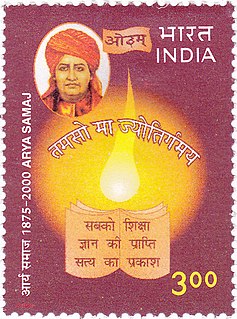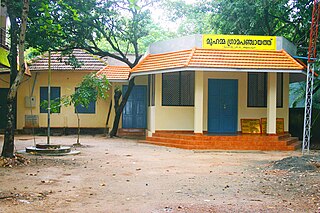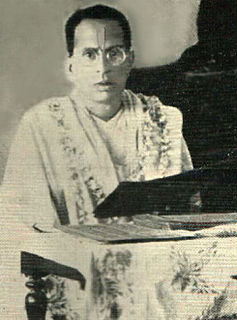Related Research Articles

The Indian Institute of Technology Bombay is a public technical and research university located in Powai, Mumbai, India.

Arya Samaj is a monotheistic Indian Hindu reform movement that promotes values and practices based on the belief in the infallible authority of the Vedas. The samaj was founded by the sannyasi (ascetic) Dayanand Saraswati on 10 April 1875. Members of the Arya Samaj believe in one God and reject the worship of idols.

Mehsana, also spelled Mahesana, is a city and municipality in Mehsana district, in the Indian state of Gujarat. Established in 14th century, the city was under Gaekwads of Baroda State from 18th century to the independence of India in 1947. The municipality was established in 1919–20. The town has population of about 185,000. Dairy, oil and natural gas are major industries while there are several small and medium enterprises in the city.
The Mandal Commission, or the Socially and Educationally Backward Classes Commission (SEBC), was established in India on 1 January 1979 by the Janata Party government under Prime Minister Morarji Desai with a mandate to "identify the socially or educationally backward classes" of India. It was headed by the late B.P. Mandal an Indian parliamentarian, to consider the question of reservations for people to redress caste discrimination, and used eleven social, economic, and educational indicators to determine backwardness. In 1980, based on its rationale that OBCs identified on the basis of caste, economic and social indicators comprised 52% of India's population, the Commission's report recommended that members of Other Backward Classes (OBC) be granted reservations to 27% of jobs under the Central government and public sector undertakings, thus making the total number of reservations for SC, ST and OBC to 49%.
Jitendra Jatashankar Rawal is an Indian astrophysicist and scientific educator, recognized for his work in the popularisation of science.

Bhadran is a village in the state of Gujarat, in far western India. It is in the Anand district. Bhadran was nicknamed the "Paris of Gaekwad state" due to its prosperity and civil works carried out by Maharaja Sayajirao Gaekwad III, the visionary ruler of Baroda.

Mohan Lal Sukhadia was an Indian politician, who served as the Chief Minister of Rajasthan state for 17 years (1954–1971). He became chief minister at age 38 and was responsible for bringing major reforms and developments in Rajasthan. For this, he is still widely revered as the "founder of modern Rajasthan".

Gujarat University is a public state university located at Ahmedabad, Gujarat, India. The university is an affiliating university at the under-graduate level and a teaching university at the postgraduate level. It is accredited B++ by NAAC. It was established in 1949.
Panchayat samiti are rural local governments (panchayats) at the intermediate level in panchayat raj institutions (PRI).
Gujarat Vidya Sabha, originally called Gujarat Vernacular Society, is a literary institution for the promotion of vernacular Gujarati literature and education, and for the collection of manuscripts and printed books; located in the city of Ahmedabad, India. It was founded by a British administrator, Alexander Kinloch Forbes, in 1848 with the Gujarati author Dalpatram. The name was changed on the occasion of the centenary of the institution.

In India, the Panchayati Raj generally refers to the system of local self-government in India introduced by a constitutional amendment in 1992, although it is based upon the traditional panchayat system of the Indian subcontinent. The recommendation of L.M Singhvi Committee(1986) was accepted. This Panchayati Raj system was formalized in 1992, following a study conducted by a number of Indian committees on various ways of implementing more decentralized administration. The modern Panchayati Raj and its Gram Panchayats are not to be confused with the extra-constitutional Khap Panchayats found in northern India.

Satpanth is a Sanskrit term used initially by Nizari Ismailis and Ismaili Sufis to identify their faith formed by their devotion and loyalty before over 700 years ago by Pir Sadruddin. Though the term today is used mainly by its subgroup formed over 600 years ago in the 15th century by his grandson Pir Imam Shah which itself consists of various sub-sects, and differs from the mainstream Nizari Khojas in that they reject the Aga Khan as their leader and are known more commonly as Imam-Shahi. Uniquely, the term Satpanth has been historically used by Ismailis that claim to be Muslim, as well as by adherents of subgroups that claim to be Hindu. There are villages in Gujarat which are totally 'Satpanthi' such as Pirana near Ahmedabad where Imam Shah is buried. Satpanthi Dargahs are known to be venerated with a stark contrast in the devotees, with outward Muslims who may wear a hijab, and outward Hindus wearing traditional garb such as the sari.

The Vishva Hindu Parishad (VHP) is an Indian right-wing Hindu militant organisation based on the ideology of Hindu nationalism.
The Mandli are a Muslim Rajput community found in the state of Gujarat in India.
The Bafan are a Muslim community found in the state of Gujarat in India and a province of Sindh in Pakistan. They are one of a number of communities of Maldhari pastoral nomads found in the Banni region of Kutch.
Mahyavanshi are a Rajput caste of India, who were originally identified with Mayavats and started a successful movement in the 20th century to establish their identity as a branch of Mayavat rulers.

The Koli are an ethnic Indian group in Rajasthan, Himachal Pradesh, Gujarat, Maharashtra, Uttar Pradesh, Uttarakhand, Haryana, Karnataka and Jammu and Kashmir states.

Pundit Devarshi Ramanath Shastri was a Sanskrit poet, scholar and commentator on Pushtimarg and Shuddhadvaita Vedanta, the philosophical school of pure non-dualism propounded by Shri Vallabhacharya (1479-1531). He was born in 1878 in Jaipur, Rajasthan in a renowned Vellanadu Brahmin family of Sanskrit scholars belonging to the Taittariya branch of Krishna Yajurveda, who migrated from Andhra Pradesh to North India in the 15th century AD and to Jaipur in the 18th century with his famous ancestor Kavikalanidhi Devarshi Shrikrishna Bhatt having been invited by Sawai Jai Singh II. His father’s name was Shri Dwarakanath Bhatt and mother’s name was Shrimati Janaki Devi. His only son was Devarshi Brajnath Shastri (1901-1954), who was also a scholar of Shuddhadvaita. He was the elder brother of epoch-making Sanskrit poet and scholar Bhatt Mathuranath Shastri. He wrote extensively in Hindi, Sanskrit and Brajbhasha languages.

The Gujarat Sahitya Akademi or Gujarat Sahitya Academy, established in 1981, is a government institution dedicated to the development of the languages spoken in Gujarat, India and their literature. Gujarati, an official language of Gujarat, is one of them; the others are Hindi, Sanskrit, Kutchi, Sindhi and Urdu. As of 2017, Vishnu Pandya is the chairman of the Akademi.

Sharda Mehta was an Indian social worker, proponent of women's education, and a Gujarati writer. Born to a family of social reformers, she was one of the first two women graduates in the modern-day Gujarat state of India. She established institutes for women's education and women's welfare. She wrote several essays and an autobiography as well as translated some works.
References
1. Vaishnav
2. Nathdwara
3. Shrinathji 4.Kotiyark,Mahudi